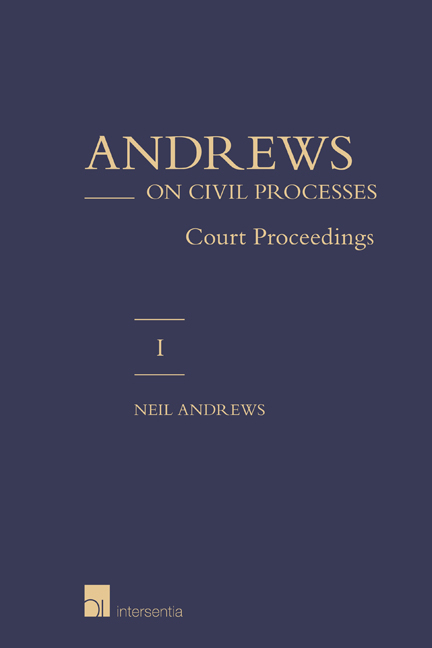Book contents
- Frontmatter
- Dedication
- Epigraph
- Preface
- Contents
- Table of Cases
- Table of Statutes
- Table of Statutory Instruments
- PART I INTRODUCTION TO THE FORMS OF CIVIL JUSTICE
- PART II COMMENCEMENT OF COURT PROCEEDINGS AND PREPARATION FOR TRIAL
- PART III END-GAME: TRIAL, APPEAL, FINALITY AND ENFORCEMENT
- PART IV COSTS AND FINANCING OF LITIGATION
- Chapter 18 Basic Costs Principles
- Chapter 19 Security for Costs
- Chapter 20 ‘No Win, No Fee’ Systems
- PART V SPECIAL PROCEEDINGS
- PART VI PRINCIPLES OF CIVIL LITIGATION
- PART VII THE EUROPEAN CONTEXT
- Select Bibliography
- Index to Volumes I and II
Chapter 20 - ‘No Win, No Fee’ Systems
from PART IV - COSTS AND FINANCING OF LITIGATION
Published online by Cambridge University Press: 13 December 2017
- Frontmatter
- Dedication
- Epigraph
- Preface
- Contents
- Table of Cases
- Table of Statutes
- Table of Statutory Instruments
- PART I INTRODUCTION TO THE FORMS OF CIVIL JUSTICE
- PART II COMMENCEMENT OF COURT PROCEEDINGS AND PREPARATION FOR TRIAL
- PART III END-GAME: TRIAL, APPEAL, FINALITY AND ENFORCEMENT
- PART IV COSTS AND FINANCING OF LITIGATION
- Chapter 18 Basic Costs Principles
- Chapter 19 Security for Costs
- Chapter 20 ‘No Win, No Fee’ Systems
- PART V SPECIAL PROCEEDINGS
- PART VI PRINCIPLES OF CIVIL LITIGATION
- PART VII THE EUROPEAN CONTEXT
- Select Bibliography
- Index to Volumes I and II
Summary
INTRODUCTION
This fundamental but intricate topic is moving at a brisk pace. It will be some time before the dust settles on changes which are currently before Parliament but which, by the time this work is published, seem destined to have transformed the ‘no win, no fee’ portfolio for English litigants. This shifting position can be summarised in four propositions.
First, at Common Law (20.07 ff) it remains contrary to public policy for a lawyer representing a client (whether a solicitor or a barrister) to have a financial interest in the outcome of the litigation, that is, his remuneration (or the level of that payment) is contingent on the outcome of the dispute.
Secondly, conditional fee agreements (20.25 ff) were introduced in 1990, and were partially implemented in 1995, and then fully implemented in 1998. But the system ran into trouble when the success fee and ATE (‘after-the-event’ legal expenses insurance) elements of this system became recoverable by the victorious party against the defeated party (the latter being the ‘paying party’). This precipitated a wave of costs litigation by aggrieved paying parties, who disputed the scale of these sums in individual cases.
Thirdly, English law was highly hesitant (20.11) to take the further step of introducing, at any rate within ordinary civil litigation, the USA system of contingency fee remuneration: that is, the successful party's lawyer is remunerated only if he wins, but his payment is a percentage of the ‘damages pay-out’ (either as a result of a successful settlement or judgment).
Fourthly, English law, as a result of recent legislation (20.13), will enable litigants (on advice by their lawyers) to choose whether to fund the litigation by using the conditional fee agreement system or the contingency fee agreement style of remuneration (20.13 ff).
We should begin by examining the Common Law background. It will then be possible to consider the contingency fee system, and finally the conditional fee agreement regime.
- Type
- Chapter
- Information
- Andrews on Civil ProcessesCourt Proceedings, pp. 559 - 584Publisher: IntersentiaPrint publication year: 2013
- 1
- Cited by



